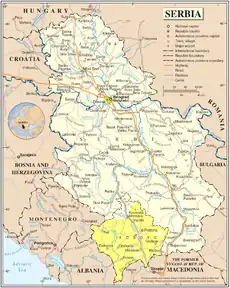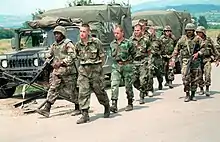United Nations Security Council Resolution 1244
United Nations Security Council resolution 1244,[1] adopted on 10 June 1999, after recalling resolutions 1160 (1998), 1199 (1998), 1203 (1998) and 1239 (1999), authorised an international civil and military presence in the Federal Republic of Yugoslavia[2][3] and established the United Nations Interim Administration Mission in Kosovo (UNMIK).[4] It followed an agreement by Yugoslav President Slobodan Milošević to terms proposed by President of Finland Martti Ahtisaari and former Prime Minister of Russia Viktor Chernomyrdin on 8 June, involving withdrawal of all Yugoslav state forces from Kosovo (Annex 2 of the Resolution).
| UN Security Council Resolution 1244 | |
|---|---|
 Official UN map of Serbia from 2007, with Kosovo highlighted. | |
| Date | 10 June 1999 |
| Meeting no. | 4,011 |
| Code | S/RES/1244 (Document) |
| Subject | The situation in Kosovo |
Voting summary |
|
| Result | Adopted |
| Security Council composition | |
Permanent members | |
Non-permanent members | |
 |
|---|
| This article is part of a series on the politics and government of Kosovo |
| Constitution and law |
Resolution 1244 was adopted by 14 votes to none against. China abstained despite being critical of the NATO offensive, particularly the bombing of its embassy. It argued that the conflict should be settled by the Yugoslav government and its people, and was opposed to external intervention. However, as the Federal Republic of Yugoslavia accepted the peace proposal, China did not veto the resolution.[4]
Kosovo unilaterally declared its independence in 2008; Serbia (the successor state to the now-defunct Federal Republic of Yugoslavia) and some other UN members have underscored that Resolution 1244 remains legally binding to all parties.[5]
Resolution

Observations
In the preamble of Resolution 1244, the Security Council regretted that there had not been compliance with previous resolutions.[6] It was determined to resolve the serious humanitarian situation and wanted to ensure that all refugees could safely return. It condemned violence against the civilian population as well as acts of terrorism, and recalled the jurisdiction and mandate of the International Criminal Tribunal for the former Yugoslavia (ICTY).
Acts
The resolution was enacted under Chapter VII of the United Nations Charter.
The Security Council decided that a solution to the Kosovar crisis was to be based upon the agreed principles contained in the annexes of the resolution.[7] It welcomed Serbia's (then part of the "Federal Republic of Yugoslavia") acceptance of the principles and demanded co-operation in their implementation. At the same time, the Council demanded that Serbia put an end to repression in Kosovo and begin a phased withdrawal;[8] after withdrawal a small number of Yugoslav and Serbian military and police personnel could return to Kosovo, if authorized by the international military presence, to carry out functions contained in the annex of the resolution.
The resolution then authorized an international civil and security presence in Kosovo. The Secretary-General was requested to appoint a Special Representative to co-ordinate the implementation of the international presence. The Council authorized countries and international organisations to establish a security presence in Kosovo, affirming the need for the immediate deployment of the international civil and security presences. The responsibilities of the international security presence included deterring new hostilities, monitoring the withdrawal of the Federal Republic of Yugoslavia, demilitarising the Kosovo Liberation Army and other Kosovo Albanian groups and ensuring a safe environment in which refugees could return.
The Secretary-General was authorized to establish an international civilian presence in Kosovo to provide an interim administration whereby Kosovo could exercise governance – pending a final status solution – through the establishment of provisional institutions of self-government. The main responsibilities of the international civil presence included the promotion of autonomy for Kosovo, performing civilian administrative functions, overseeing the development of the institutions including the holding of elections, maintaining law and order, protecting human rights and ensuring the safe return of refugees.
The Council emphasized the need for humanitarian relief operations and encouraged all states and organisations to contribute towards economic and social reconstruction. All parties, including the international presence, had to co-operate with the ICTY. It demanded that armed Kosovar groups end their offensives.
Finally, it was decided that the international civil and security presences were to be established for an initial period of 12 months,[9] while the Secretary-General was requested to keep the Council informed on developments. Unusually for UN peace-keeping missions, this one was to continue after the initial 12-month period unless the Security Council determined otherwise: normally, the continuing mandate of missions is subject to resolutions after 12 months which allow for revisions to the original mandate.
Summary
The main features of Resolution 1244 were to:
- Demand in particular that the Federal Republic of Yugoslavia put an immediate and verifiable end to violence and repression in Kosovo;
- Complete verifiable phased withdrawal from Kosovo of all military, police and paramilitary forces according to a rapid timetable, with which the deployment of the international security presence in Kosovo will be synchronized;
- Place Kosovo under interim UN administration (performed by the United Nations Interim Administration Mission in Kosovo, UNMIK);
- Authorize international peacekeeping force with substantial NATO participation in Kosovo (currently performed by the Kosovo Force, KFOR);
- Allow for the return of an agreed number of Yugoslav and Serbian personnel to maintain a presence at Serbian Patrimonial sites and key border crossings;
- Direct UNMIK to establish provisional institutions of local self-government in Kosovo (PISG);
- Reaffirm the commitment of UN member states to the sovereignty and territorial integrity of the Federal Republic of Yugoslavia and the other States of the region, as set out in the Helsinki Final Act and annex 2 of UNSCR 1244 (an annex that both affirms the sovereignty of the Federal Republic of Yugoslavia and envisions, inter alia, a Kosovo status process);
- Require the UN to assure the safe and unimpeded return of all refugees and displaced persons to their homes in Kosovo and to ensure conditions for a peaceful and normal life for all inhabitants of the province;
- Require that the KLA and other armed Kosovo Albanian groups be demilitarized;
- Authorize the United Nations to facilitate a political process to determine Kosovo's future status. Kosovo's future status would take into consideration the Rambouillet Agreement which Serbia refused to sign in 1998, and which calls for the "will of the people of Kosovo" to be one of the guiding principles in defining Kosovo's status, another being the respective compliance of the disputing parties to the Agreement. The resolution reaffirms calls for "substantial autonomy and meaningful self-administration for Kosovo".
Significance
Serbian stance
Article 1 of the Helsinki Final Act places a high value on the sovereignty and territorial integrity of existing states. In a similar fashion the references to autonomy in 1244 articles indicate a desire by UN Member-States at that time to return Kosovo to a pre-1990 autonomous status, if possible.
But the EU's Venice Commission noted that:
With respect to substantial autonomy, an examination of the Constitution, and more specifically of Part VII, makes it clear that this substantial autonomy of Kosovo is not at all guaranteed at the constitutional level, as the Constitution delegates almost every important aspect of this autonomy to the legislature ... it is clear that ordinary law can restrict the autonomy of the Provinces.
This possibility of restricting the autonomy of the Provinces by law is confirmed by almost every article of Part 7 of the Constitution ...
Hence, in contrast with what the preamble announces, the Constitution itself does not at all guarantee substantial autonomy to Kosovo, for it entirely depends on the willingness of the National Assembly of the Republic of Serbia whether self-government will be realised or not.
"Substantial autonomy" under the 1974 Yugoslav Constitution required Kosovo acceptance of any laws restricting its authority.
Serbia sought international validation for its stance, and in October 2008 requested a judgement from the International Court of Justice.[10] However, the Court ruled that the declaration of independence was legal.[11]
Kosovo Albanian stance
On 17 February 2008 representatives of Albanians living in Kosovo, acting outside the UNMIK's PISG framework (not representing the Assembly of Kosovo or any other of these institutions),[12] issued a declaration of independence establishing the Republic of Kosovo. On 22 July 2010 the International Court of Justice ruled that the declaration of independence of 17 February 2008 did not violate general international law, Security Council resolution 1244 (1999) or the Constitutional Framework, because the authors of the declaration, who named themselves "representatives of the people of Kosovo" were not bound by those documents.[13]
A key argument on the Kosovars' side was that Article 1 and article 8 of the Helsinki Final Act makes the continued territorial integrity of sovereignty of states conditional upon their willingness and ability to guarantee the fundamental human rights also defined in the Final Act.
Press comments
The Economist describes the resolution as "redundant" following the declaration of independence, stating that "references to it are used to save face for Serbia".[14]
See also
References
- "RESOLUTION 1244 (1999)". undocs.org. Retrieved 9 March 2017.
- "Profile: Serbia and Montenegro". BBC. 5 June 2006.
- Member States of the United Nations, UN.org: "Serbia – date of admission 1 November 2000, The Federal Republic of Yugoslavia was admitted as a Member of the United Nations by General Assembly resolution A/RES/55/12 of 1 November 2000. On 4 February 2003, following the adoption and promulgation of the Constitutional Charter of Serbia and Montenegro by the Assembly of the Federal Republic of Yugoslavia, the official name of "Federal Republic of Yugoslavia" was changed to Serbia and Montenegro. In a letter dated 3 June 2006, the President of the Republic of Serbia informed the Secretary-General that the membership of Serbia and Montenegro was being continued by the Republic of Serbia, following Montenegro's declaration of independence."
- "Security Council, welcoming Yugoslavia's acceptance of peace principles, authorises civil, security presence in Kosovo". United Nations. 10 June 1999.
- "General Assembly GA/10980". United Nations. 9 September 2010. Retrieved 7 November 2013.
- Reka, Blerim (2003). UNMIK as an international governance in post-war Kosova: NATO's intervention, UN administration and Kosovar aspirations. Logos-A. p. 167. ISBN 978-9989-58-096-3.
- The Security Council Resolution n. 1244/1999 could give pardon to NATO intervention – by reference to the armistice agreements between NATO and the Yugoslav government, made into paragraph 10 of its Annex 2 – only if the prohibition of the use of force (provided in Article 2 paragraph 4 UN Charter) is seen as a rule which can be waived with the consent of the international community: Buonomo, Giampiero (2002). "Non sempre la guerra "offre" giurisdizione extraterritoriale: l'occasione mancata del caso Bankovic". Diritto&Giustizia edizione online. – via Questia (subscription required)
- "UN Security Council votes in favour of Kosovo peace plan". Raidió Teilifís Éireann. 10 June 1999.
- Miller, Judith (11 June 1999). "Security Council backs peace plan and NATO-led force". The New York Times.
- "Serbian president visits Kosovo". BBC. 17 April 2009.
- Beaumont, Peter (22 July 2010). "Kosovo's independence is legal, UN court rules". The Guardian.
- The identity of the authors of the declaration of independence, ICJ ruling, par.102–109 Archived 21 August 2010 at the Wayback Machine
- "Advisory Opinion of 22 July 2010" (PDF). The Hague, The Netherlands: International Court of Justice. Archived from the original (PDF) on 21 August 2010. Retrieved 19 August 2012.
- T.J. (2 March 2012). "Belgrade moves closer to Brussels". The Economist. Retrieved 24 January 2021.
External links
 Works related to United Nations Security Council Resolution 1244 at Wikisource
Works related to United Nations Security Council Resolution 1244 at Wikisource- Text of the Resolution at undocs.org